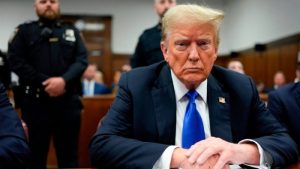Can Europe’s unity survive as its sense of crisis grows?
EU leaders gathering in Budapest on Friday to contemplate Donald Trump’s election victory, mourn the continent’s flagging competitiveness and consider the potential remedies will find two old friends waiting for them at the summit table.
One will be Mario Draghi, the former ECB president credited with “saving” the euro during the continent’s 2010-2012 financial crisis, which threatened the single currency’s existence. He is now leading the charge for a root-and-branch overhaul of the bloc’s industrial approach, a mission likely to become more urgent as Trump pivots the US towards a more protectionist trade policy.
The second will be the ghost of that crisis, when the frugal, rich northern EU states blamed their more spendthrift, indebted southern allies for dragging the bloc towards fiscal ruin, and ultimately imposed painful terms on those requiring a bailout.
Those fiscal faultlines from more than a decade ago left deep scars on the continent, as Germans, Dutch, Greeks and Portuguese accused each other of endangering the European project. Now they are returning to the surface as the EU confronts a new crisis: its long-term global economic relevance.
The sense of crisis grew on Wednesday after Trump was re-elected US president. Analysts at Goldman Sachs believe his pledges to impose tariffs on US imports from Europe and demand that the continent spend more on its own defence will further curtail economic growth in the EU.
Trump has also pledged to roll back swaths of environmental legislation, which EU officials fear will leave European businesses at a further competitive disadvantage.
The twin challenges of the Covid-19 pandemic and the Russian invasion of Ukraine resulted in remarkable unity among the EU’s 27 members. But the question of how to fund the competitiveness fightback and mitigate the impact of Trump is sweeping away that collective bonhomie, bringing back old divisions and delaying agreement.
“You cannot pay for competitiveness. You have to create the conditions for it,” says a senior EU diplomat present in Budapest. “[And] where is this new money supposed to come from? Borrow against future generations? Or expect other member states to pay for you?”
Draghi, in a comprehensive report into the EU’s economic malaise, has suggested €800bn in additional investments each year will be needed to fix it. Public money is likely to account for a significant chunk of that.
“It doesn’t have to be a war or a pandemic to recognise that we are faced with deep underlying problems regarding our competitiveness that need to be addressed,” Greek Prime Minister Kyriakos Mitsotakis tells the FT, describing the issue as “the elephant in the room”.
At the same time, national governments are reining in spending in response to new EU rules meant to reduce public debt burdens inflated by Covid and emergency energy subsidies.
That leaves little fiscal space on national balance sheets to pursue investment in everything from greening the economy to digital infrastructure and defence. Currently, member states are benefiting from the debt-funded post-Covid €724bn Recovery and Resilience Facility (RRF), but that is set to expire in 2026.

When it comes to Europe’s rising future investment needs, there is no appetite among “frugal” nations for more joint debt issuance, higher contributions to Brussels’ coffers, or giving the EU revenue-raising powers of its own.
“Getting ahead in technology and being self-reliant in defence are essentially very expensive lottery tickets. There’s no guarantee that if you spend money you’re going to be better off,” says Adam Posen, president of the Peterson Institute for International Economics.
“But the odds are much better than the average lottery, and the payouts are enormous. You want to be buying those tickets,” he adds, warning that “the contractionary bias in fiscal policy and foregoing European fiscal borrowing capacity” risks the continent passing up such opportunities.
Talk of more money has rapidly become the most fractious division in EU politics. “What matters to us are the proposals made by Draghi, and especially the financing question,” says one EU official. “Do we go into new instruments? What kind of instruments? This discussion is needed.”
EU leaders were set to agree a statement at the Budapest meeting including a line on the need to “explore the development of new instruments” for future financial needs. But officials are downplaying the importance of what one describes as “harmless, empty wording”.
The new Dutch government, a coalition led by the populist and Eurosceptic Freedom party, is even demanding more money back from the next EU budget.
“We need investment, nobody disagrees about that, but how we’re going to finance that, that’s another discussion,” Eelco Heinen, the Dutch finance minister, said this week. Heinen is from a more moderate centre-right party but nevertheless said: “I’m not a big fan of more common debt . . . I don’t think that’s the path forward.”
It is in this febrile fiscal situation that the leaders gather for a debate that is set to dominate the next two years of EU policymaking. “It is going to be a very difficult discussion . . . there is a fundamental misalignment between our goals and our means,” says Mitsotakis.
“We either need to trim our goals or we need to increase the means. And I’m in favour of the second, obviously.”
In 2020, the EU took the groundbreaking step of issuing up to €800bn of joint debt to finance a package of NextGenerationEU funds designed to help countries recover from the pandemic.
The initiative built on the grand bargain that lies at the heart of the European project: that countries pay into the bloc’s shared budget based on their wealth, and receive funds based on their relative need. Cohesion funds, designed to help raise individual regions up to the EU’s average wealth, are the most striking example of this fiscal compromise.
But that understanding fractured in 2010 as the global financial crisis swept across Europe. Countries such as Greece required enormous fiscal support in order to avoid defaults that could have ruptured the eurozone. Richer countries, such as Germany, blamed economic mismanagement for the problems.
FT Edit
This article was featured in FT Edit, a daily selection of eight stories to inform, inspire and delight, free to read for 30 days. Explore FT Edit here ➼
The crisis response dominated EU leaders’ summits for five years, as member states sought to protect their own economies and apportion blame for an economic slowdown that contributed to the collapse of at least eight national governments.
Charles Michel, who attended his first summit of EU leaders as Belgian prime minister in October 2014, remembers arriving at the meeting to find an “extremely divisive” atmosphere as Berlin and Athens clashed.
“It was super aggressive, super confrontational,” he recalls. “[It] was a tragedy in terms of lack of trust, a lack of personal trust . . . worse than that, there was even a kind of lack of respect. The debates were very difficult, full of caricatures, very ideological.”

A few years later, Michel was chairing those summits and trying to forge consensus during a five-year term as President of the European Council — a period that coincided with the pandemic and Russia’s invasion and which concludes at the end of November.
Michel believes there is unity on the core issues around fixing competitiveness but admits to big divisions over the details and the cash involved.
“Of course there are things that are not fixed and that the European Council will have to fix. And this is related to money,” he tells the FT. “We agree that we need to invest more money. But the question is how do we pay? What part is public, what part is private?”
“Solidarity should work on both sides,” Michel continues. “If we want to move to compromise, if we want to make an agreement, we need to reassure each other that we are serious and that solidarity is not only a question of moving money from this pocket to that pocket, it is also about the one who is getting more money doing what is needed,” he adds.
The former Dutch premier, Mark Rutte, emphasised at his last summit in June that he agreed to the RRF only because of its strict conditionality, with money disbursed when countries agreed to reforms. But he stressed that “it was not a Hamiltonian moment,” a reference to Alexander Hamilton’s federalisation of US states’ debts in 1790.
Pairing requests from poorer countries (more shared financing) with the conditions of richer ones (more economic reforms and a deeper single market) is an obvious approach of Draghi’s report, and the reason why Michel and the summit’s host, Hungarian prime minister Viktor Orbán, have asked the Italian to attend in person.
They believe that it will be harder for leaders to emphasise parts of his report and ignore others if its author is sitting in the room.
“We cannot cherry pick from the Draghi report what we like,” says Mitsotakis. “You either take it or you leave it, because it’s a very consistent document.”
Divergent approaches and national stereotypes from the past decade are resurfacing just as the 27 capitals gear up for three years of wrangling over the next shared budget, which will run from 2028 to 2034.
While historically limited to 1 per cent of the EU’s GDP over seven years, there is growing awareness that Europe’s vast and growing needs would require much higher investments — according to Draghi, equivalent to up to 4.7 per cent of EU GDP per year.
Trump’s win has only increased the potential cost. The EU’s incoming defence commissioner said this week that continental air defence system alone would cost €500bn, around 50 cent more than member states collectively spend on defence each year.
With public budgets already stretched across the continent, Draghi and others are making the case for investments at EU level by issuing a top-rated European bond. But that is a red line for countries that don’t wish to subsidise those they regard as fiscally irresponsible neighbours.
“The eurobond is really a eurobund,” says one government official, referring to the German sovereign debt instrument that underpins the EU’s triple-A credit rating.
Commission President Ursula von der Leyen has explicitly ruled out more common debt to finance investment, insisting on either national contributions or new EU-wide taxes. “There are no other ways to finance future projects,” she said last week.
But there’s very little appetite among member states for either of those. Giving Brussels more revenue-raising power is the ultimate taboo for many countries. Requests for higher contributions to the common budget are scarcely any more popular.
At the crux of the debate is the concept of European “public goods” or “common needs”: shared infrastructure, resources or supplies that every member state needs or could come to rely on — and thus should fund collectively.
Even before Trump’s victory, Russia’s war against Ukraine has meant defence proposals, such as eastern border fortifications, have joined other ideas such as cross-border energy grids on a future wish list.
“I mean, this has always been the same discussion in Europe: Is there a European public good? Are we going to be, as Europeans, better off if we do some of these things?” says Mitsotakis. “And if we are, as Europeans, better off, will we also be better off as Greeks, Germans or Dutch?”
But even on defence the old faultlines are visible. The strongest demands for collective spending on security unsurprisingly come from countries closer to Russia which joined the EU more recently — and contribute less to the budget.
The strongest rebuttals come from older, richer member states further west. “If they want to buy air defence products, they are more than welcome to pay for it themselves,” says one senior official from a net contributor state. “Why should we trade our triple A rating for their national needs?”
In heated private discussions at a summit of EU leaders in June, Poland’s prime minister Donald Tusk personally rounded on German chancellor Olaf Scholz and Rutte after they refused to contemplate shared funding of EU defence needs. Tusk’s anger was exacerbated by the irony that Rutte had been selected as the next secretary-general of Nato with a mandate to ramp up spending.
A week later at a joint press conference with Scholz, Tusk said he was “irritated” at the chancellor’s position. “We would just like to point out to everyone, including our German partners, that the issues of the continent’s security should not be seen separately and sometimes in competition with various initiatives.”
Whatever the outcome of the Budapest discussions, few see any short-term compromise in the brewing fiscal battle between broadly the EU’s north-west and south-east.
Minutes after the Draghi report was published, Germany’s then finance minister Christian Lindner posted on X that joint EU borrowing would not solve structural problems, urging the bloc to tackle bureaucracy and improve access to private capital instead.
“Proposing joint EU borrowing in the current political climate across the EU is an absolute non-starter,” says a diplomat from a northern state. “The German, Dutch, Austrian governments will have none of it and the Nordics aren’t keen either. So there’s no AAA-ratings to borrow against.”
“Tying any part of [the Draghi report] to joint EU borrowing will suck all the oxygen out of the room,” the diplomat adds. “And the parts of his proposals that are feasible will suffer as a result.”
Dirk Gotink, a Dutch MEP from his country’s centre-right New Social Contract party, says that given fiscal constraints across the bloc, “synchronising priorities between member state capitals and spending more efficiently will be key to making sure that more money actually delivers more security.”

“Consensus has been pushed as far as it can . . . in relation to new forms of funding,” says Paschal Donohoe, president of the group of Eurozone finance ministers, which this week issued a carefully worded statement highlighting the primacy of private funding. “My expectation is that prime ministers will probably reach a similar view.”
But those supporting a bigger budget, or more joint borrowing, believe that it will ultimately emerge as the only option should the EU’s fiscal needs continue to grow and governments contemplate the full implications of a new Trump administration.
Many regard Paris and Berlin, the EU’s two most powerful capitals, as the key players in breaking the bloc’s funding impasse — just as they were in 2020.
On a hastily arranged telephone call on Wednesday, French President Emmanuel Macron and Germany’s Scholz pledged to work more closely towards “greater [European] sovereignty”, according to the Élysée Palace — though that task will be further complicated by the collapse of Germany’s fractious coalition government.
But Mitsotakis sees opportunity in the turmoil. “I remember the RRF negotiations when Merkel said no — until she said yes,” he says. “A crisis is always focusing the mind.”
“What Draghi points out is that there are two types of crisis,” the Greek prime minister continues. “There’s a pandemic type of crisis, and there is a slow erosion of us gliding towards irrelevance. That’s a crisis as well, huh?”
Additional reporting by Eleni Varvitsioti in Athens
Data visualisation by Janina Conboye
#Europes #unity #survive #sense #crisis #grows








